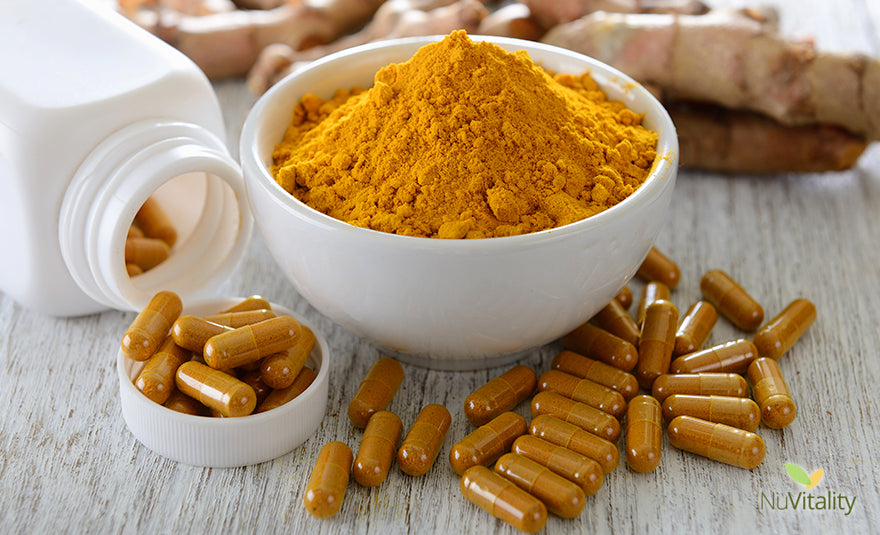
Supplementation is an increasingly popular tool for improving our health, with more and more options becoming available for that goal. With such a wide assortment of supplementary products, it can be somewhat challenging to navigate the dos and don'ts of their use.
One of the biggest concerns with modern supplementation involves the interactions certain supplements have with prescription medications. In some situations, supplements and medication have no significant interactions and can be taken together without fear. Unfortunately, it is more common for certain substances to conflict with one another and cause damage to the body.
Ultimately, the situation varies depending on how the supplement and medication function. This concern has become more relevant for those who take advantage of the health benefits offered by curcumin.
Curcumin is a naturally occurring curcuminoid found in a root called Curcuma longa, colloquially known as turmeric. Despite the bounty of health benefits curcumin provides, there are concerns about how it might interact with certain medications. One of the chief concerns of curcumin users is whether they can safely use curcumin supplements alongside prescription blood pressure medication. Determining whether this supplement can safely interact with your blood pressure medication is critical to ensuring you do not suffer a serious medical issue. When mixing supplements with medication, one wrong step could have fatal results.
What is Blood Pressure?
If you are taking blood pressure medication, you likely have a general idea of what blood pressure is and its relevance to your health. Regardless, there are certain details that doctors do not tell their patients solely because it has no direct bearing on treating blood pressure levels. However, understanding the details of blood pressure is important when weighing the pros and cons of supplementing while on prescription medication.
Blood pressure is assessed at virtually any doctor's appointment to keep medical records up to date, so your doctor can determine the state of your cardiovascular health. You no doubt recall when your physician wrapped the sphygmomanometer around your arm, though the name might be unfamiliar.

A sphygmomanometer consists of a Velcro cuff connected to a handheld air pump and pressure gauge. When inflated, the cuff squeezes your arm and allows the doctor to read your systolic and diastolic blood pressure levels. Generally, your systolic blood pressure needs to be no higher than 120 mm Hg and your diastolic blood pressure no higher than 80 mm Hg. The ideal range for systolic blood pressure should be between 90 and 120 mm Hg, while your diastolic blood pressure should be between 60 and 80 mm Hg. Anything outside these ranges indicates a health issue.
Our blood pressure is more fragile than most people realize and is impacted by multiple factors in our day-to-day lives. Namely, a poor diet and a sedentary lifestyle can negatively affect our blood pressure levels and lead to serious health issues. Understanding the ramifications of blood pressure irregularities is crucial to treating the effects and will determine what medication you prescribe to restore your levels to normal.
Hypertension vs. Hypotension
Despite both conditions relating to irregularities in blood pressure, the effects of these conditions differ greatly. At a glance, the biggest difference between the conditions is that hypertension indicates higher than normal blood pressure, while hypotension indicates low blood pressure. Unfortunately, the differences go beyond this and determine what symptoms and subsequent issues you might develop. The biggest concern is that blood pressure issues are remarkably common in the modern era, and you might find yourself dealing with one before you know it.
Hypertension is one of America's most common cardiovascular health conditions, with over 75,000,000 Americans suffering the effects. The most terrifying part of hypertension is that most people are unaware they have it. Hypertension almost never presents with symptoms and instead causes other health conditions to manifest while it continues to damage you. Typically, catching hypertension requires proactive observation of your blood pressure via regular appointments with your physician.

After a certain point, hypertension might cause some of the following symptoms:
- Fatigue
- Visual Issues
- Chest Pain
- Irregular Heartbeat
- Difficulty Breathing
- Headaches
- Blood in Urine
Unfortunately, these symptoms are extremely rare and will usually only manifest after hypertension has caused another health condition to manifest. Sadly, hypotension is not much better. The cause of hypotension is still not fully understood, though there are theories that age, hormones, and other health conditions might cause your blood pressure to drop. Unlike hypertension, hypotension always presents with symptoms. Low blood pressure without symptoms is not a cause for concern. The symptoms typical of hypotension include:
- Dizziness
- Fatigue
- Nausea
- Fainting
- Blurred Vision
- Paleness
Regardless of your condition, a lifestyle change is one of the first things your doctor will prescribe. Beyond that, medications exist to raise or lower blood pressure levels to accelerate recovery. The type of medication you receive will vary based on your condition, but the treatments can be very effective. This brings us to how turmeric factors into blood pressure regulation.
Turmeric and Blood Pressure
While considered safe for human consumption, the Curcuma longa root is not a perfect example of plant life. While raw turmeric is almost useless as a supplement, the curcumin content is harvested and refined to create a powerful health booster. Over curcumin's history, we have worked to overcome the handicaps inherent in the substance so we can enjoy its benefits without issue.
Unfortunately, just because curcumin offers a lot does not mean there are no risks. As we mentioned, curcumin is considered a safe substance, although there is no oversight from the Food and Drug Administration insofar as curcumin is concerned. Nevertheless, sometimes the risk of a product is how its benefits might impact other substances in our system.

Among curcumin's health benefits is its ability to improve the function of our blood vessels and promote healthier blood flow in the body. This improved blood flow results from dilating the blood vessels found in our bodies. Dilation, in this instance, means that curcumin can widen our blood vessels and allow blood to flow with fewer issues. Improved blood flow means our cardiovascular health is improved to a certain extent, and our blood pressure is reduced.
To this end, curcumin is a natural tool for keeping our blood pressure regulated, though it should not be used as the sole treatment for hypertension. The effects of curcumin on its own are minimal enough to be safe and not risk lowering our blood pressure too much.
Unfortunately, this benefit can backfire for those taking blood pressure medication due to hypotension or hypertension. This ultimately brings us to the question that led you to this article.
Can You Use Turmeric With Blood Pressure Medication?
The short answer to our ultimate question is "no." Due to their interactions, taking curcumin supplements and blood pressure medication simultaneously is a very bad idea. Depending on whether you are treating hypotension or hypertension, you will be trying to raise or lower your blood pressure.
Regardless of which one you are treating, the medications your physician prescribed will almost certainly conflict with the natural effects of turmeric curcumin. To start, let us consider the medications used for hypotension. In the case of hypotension, your efforts are dedicated to raising your blood pressure to a healthy range, but turmeric curcumin does the opposite.
Turmeric curcumin naturally lowers blood pressure to improve blood flow and heart health. While the effects of curcumin can seldom interfere with high-grade pharmaceuticals, taking curcumin with your hypotension medication could slow your recovery and increase your risk of other health issues. While the likelihood of curcumin supplements inhibiting your hypotension medications is not overly high, it is not a risk worth taking. Using a supplement whose effects directly oppose the effects of your prescription medication will only drag out the recovery process. Unfortunately, the biggest issue relates to those who are treating hypertension.
When dealing with hypertension, your goal is the inverse of treating hypotension, and you will be prescribed medication to lower your blood pressure. While it might seem like there is little issue in this scenario, hypertension medication is an extremely powerful substance. Furthermore, curcumin is known for compounding with other substances to reinforce the effects with its own.

Taking curcumin supplements and hypertension medication simultaneously could cause your blood pressure to drop too low. Because curcumin naturally lowers blood pressure, your hypertension medication combined with curcumin could induce hypotension due to the excessive effects.
While curcumin will not cause your blood pressure to spike, inducing hypotension puts you at significant risk. A significant drop in blood pressure can lead to sudden uncontrolled bleeds, which you no doubt know is not a good sign. Unfortunately, curcumin's interactions with other medications also contribute to these bleeds. Curcumin is an anticoagulant, meaning it thins your blood to make it flow easier. Anticoagulants have their place in medicine but should never be used when you are at risk of suffering a bleed.
Anticoagulants like curcumin prevent blood from clotting, which means bleeds can go on indefinitely instead of stopping like normal. Combining hypertension medications with curcumin supplements could trigger a significant enough drop in blood pressure to trigger a bleed. Combined with curcumin's anticoagulant properties, the bleeds might not stop, leading to losing more blood than is healthy. This is not to say you will bleed out from a pressure bleed but losing a lot of blood at once could cause you to faint and hurt yourself worse. Depending on what is around, you might even cause an injury that triggers a secondary bleed.
Ultimately, combining curcumin with blood pressure medication is not liable to end fatally but can cause your hypertension medication to work too well. What happens after this could potentially lead to dangerous side effects or injuries that you would otherwise avoid. Despite these risks, curcumin remains an extremely viable supplement for those uninhibited by blood pressure issues.
How to Use Turmeric Safely
As previously mentioned, virtually every organization considers turmeric curcumin safe for human consumption. While there are no federal turmeric dosage or use regulations, independent studies have confirmed the substance is safe when used properly. Fortunately, the issues with turmeric are limited to interactions with other medications or certain diseases like diabetes. This means safe curcumin use involves consulting with your physician to ensure there will be no interactions.

However, you should avoid curcumin use if you have:
- Bleeding Disorders
- Gallbladder Issues
- Anemia
- Iron Deficiency
- Hormone-Sensitive Health Issues
Technically, there is no federally enforced dose of curcumin, but the FAO and WHO do have recommendations for a healthy turmeric intake. The safest amount of curcumin to consume is 1.4 mg per pound of body weight. So, a 200 lb. man would have a daily recommended dosage of 280 mg daily. Aside from this, you only need to ensure that your supplement comes from a reputable vendor.
Once upon a time, there was an issue where vendors would add toxic metals to low-grade turmeric to improve the color. Fortunately, these issues are not prevalent in modern markets, and finding a vendor for a safe supplement is easier than ever.
The Nu Healthier You
Despite curcumin's issues with blood pressure medications, the substance is a remarkably safe and beneficial supplement. It does have a few shortcomings, but these have been resolved by introducing other natural ingredients to reinforce curcumin's bioavailability. While you might be wary of using curcumin after learning of its harmful interactions with blood pressure medication, you only need to find a vendor offering a safe supplement. While there are multiple options, the solution for your curcumin needs is closer than you might think.

We at NuVitality believe in delivering healthy supplements for any situation. Among our products is a completely safe turmeric curcumin supplement reinforced with black pepper to solve the bioavailability issues. As mentioned before, consult with your physician if you are on any prescription medications or have a chronic health condition. Ultimately, most issues will not impede your ability to enjoy curcumin's benefits. So, take the first step on the journey to the Nu, healthier you!





![[Guide] Can You Take Turmeric With Your Other Vitamins?](http://nuvitality.us/cdn/shop/articles/A_Bowl_of_Powdered_Turmeric_medium.jpg?v=1663544569)
